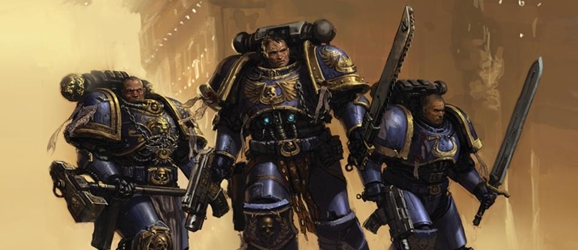Games Workshop Claims To Own Trademark On Space Marines

Here at Giant Freakin’ Robot, we liberally spread our opinions over the stories we bring to our readers, but rarely do we dislike something so much that we want to throw a big, heavy book at it. The company Games Workshop, creators of the Warhammer series, has our crosshairs aimed directly at it, however, for trying to co-opt a science fiction term that has been around for decades longer than the company itself.
See, Games Workshop claims to own the decades-old phrase “space marine.” Back in December, they convinced Amazon to stop selling author M.C.A. Hogarth’s novel, Spots the Space Marine, claiming they have trademarked “space marine” and no one else can use it, so nyah nyah. It’s worth noting that Amazon didn’t have to take the book away, since no legal steps were undertaken at the time. While it seemed like a frivolous case, nothing has been resolved and Games Workshop is continuing to stake their claim.
Hogarth posted a blog that updated the communication between her and the company. Highlights, or lowlights rather, include the following:
In their last email to me, Games Workshop stated that they believe that their recent entrée into the e-book market gives them the common law trademark for the term “space marine” in all formats. If they choose to proceed on that belief, science fiction will lose a term that’s been a part of its canon since its inception. Space marines were around long before Games Workshop. But if GW has their way, in the future, no one will be able to use the term “space marine” without it referring to the space marines of the Warhammer 40K universe.
A Games Workshop trademark of the term ‘Adeptus Astartes’ is completely understandable. But they’ve chosen instead to co-opt the legacy of science fiction writers who laid the groundwork for their success. Even more than I want to save Spots the Space Marine, I want someone to save all space marines for the genre I grew up reading. I want there to be a world where Heinlein and E.E. Smith’s space marines can live alongside mine and everyone else’s, and no one has the hubris to think that they can own a fundamental genre trope and deny it to everyone else.
At this point I’m not sure what course to take. I interviewed five lawyers and all of them were willing to take the case, but barring the arrival of a lawyer willing to work pro bono, the costs of beginning legal action start at $2000 and climb into the five-figure realm when it becomes a formal lawsuit. Many of you don’t know me, so you don’t know that I write a business column/web comic for artists; wearing my business hat, it’s hard to countenance putting so much time and energy into saving a novel that hasn’t earned enough to justify it. But this isn’t just about Spots. It’s about science fiction’s loss of one of its foundational tropes.
When reached for comment by IGN to clarify the situation, Hogarth wrote back:
Right now I am hoping to for one of the following things:
– To find a lawyer willing to work with me pro bono;
– To be able to pay for a lawyer otherwise;
– Or to have the public support to encourage Games Workshop to contact Amazon and tell them I am no longer infringing on their trademark. Amazon won’t re-instate the e-book without their okay.When I called Games Workshop and pointed out previous books using the word “space marine,” they told me their grounds for complaint was based on the European trademark (which is not valid in the US). I explained that, and was told they believed their publication of novels and e-books awards them a common law trademark in America. This would only work if there weren’t other authors predating them who had used the term — they’re the ones, then, that would have the right to the common law trademark.
That’s my understanding, anyway.
I could go on for quite a while about the heinousness of Games Workshop’s attitude and actions, but instead, I’ll just sit back and seethe while you readers take control. Maybe go tell Games Workshop that you’re a space marine, and you want nothing to do with them. But don’t use the word “nothing,” cause that one’s mine.












